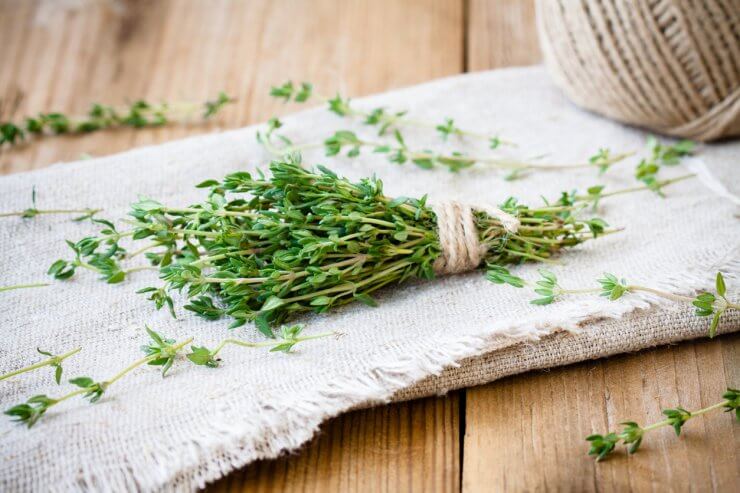
Fresh bundled thyme
Since ancient times, thyme has been recognized for its health benefits, as well as a seasoning for food. The Egyptians used thyme in embalming and Hippocrates recommended thyme for respiratory diseases and conditions. Physicians and herbalists prescribed the herb for stomach and throat ailments, as well as menopause symptoms. Thyme was also thought to protect people from the Black Death and heal blistered skin.
Today, science tells us that thyme leaves, flowers, and essential oil indeed offer a range of medicinal benefits: as an antibacterial and antiseptic, a balm for coughs and colds, relief from diarrhea and other stomach and intestinal ailments, and acne relief, among others.
Studies have also associated consumption of thyme with protection against some cancers, high blood pressure, arthritis, and other conditions.
Heart Health
Heart disease, including heart attacks and strokes, is the number one cause of death in the United States. A clinical study on animals has shown that an aqueous extract obtained from wild thyme can reduce blood pressure, and the findings might have positive implications for humans.
Cancer Prevention
A study carried out in Lisbon, Portugal, found that extracts of mastic thyme might protect people from colon cancer. And researchers in Turkey looked at the effect of wild thyme on breast cancer activity, and found it caused the cells to die.
Acne Control
Studies have shown that thyme, with its anti-bacterial properties, might be helpful in treating acne. Thyme’s antibacterial effect proved stronger than that of standard concentrations of benzoyl peroxide, the active ingredient in most acne creams and washes—without benzoyl peroxide’s burning and irritating side effects.
Additional benefits of thyme
Thyme oil, even at low concentrations, showed potential as a natural food preservative against several common foodborne bacteria that cause human illness. And thyme’s anti-fungal properties have shown to be beneficial in treating common skin problems.
Bottom Line
While some further medical studies might be required to confirm the health benefits of thyme, eating your own home-grown varieties is a great way to ensure a healthier diet.
Did you know that thyme can be so healthful? Please tell us about healthy ways you use thyme.


 Previous
Previous


Fresh and dried thyme (thymus vulgaris) is considered safe when consumed in normal food quantities. However, its essential oil can contain high concentrations of thymol, which can be toxic when ingested. As always, consult your physician before taking any herbal supplements and remedies.
also, one variety of thyme with thymol can be toxic to human
please include the latin name with each plant…for instance, when you talk about thyme, please tell th latin name or specific variety that has written characteristics